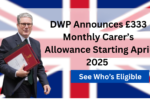Millions of UK workers are set to receive a significant pay boost next week as the government’s new wage adjustments come into effect. The changes, which will benefit over three million employees, include increases in the National Living Wage (NLW) and the National Minimum Wage (NMW). These adjustments aim to support low-paid workers amid rising living costs and inflationary pressures.
What Are the Changes?
Starting from April 1, 2025, the National Living Wage will increase to £12.21 per hour, up from the current £11.44. This means that full-time workers aged 21 and over could see an annual pay increase of approximately £1,400.
The National Minimum Wage (NMW), which applies to younger workers, is also set to rise:
- Ages 18-20: Wage increases from £8.60 to £10.00 per hour (a 16.3% rise)
- Ages 16-17 and apprentices: Wage increases from £6.40 to £6.83 per hour
These changes mark one of the largest minimum wage hikes in recent years, aimed at helping workers manage the increased cost of living.
Why Is This Happening?
The pay increases come as part of the UK government’s broader efforts to ensure wages keep pace with inflation and rising living expenses. The adjustments were recommended by the Low Pay Commission, an independent body that advises the government on fair wage levels.
With the UK facing ongoing economic challenges, including high inflation rates and increased household expenses, these wage hikes are designed to provide relief to millions of workers, particularly those in retail, hospitality, and care sectors, where lower wages are more common.
The Chancellor of the Exchequer stated that the increase reflects the government’s commitment to ensuring that work always pays. “We are making sure that workers, especially those on lower incomes, benefit from a fair wage that supports their cost of living,” he said in a recent statement.

Who Will Benefit the Most?
The increase in wages will primarily benefit workers in low-paying industries such as:
- Retail and supermarkets
- Hospitality (restaurants, pubs, hotels)
- Care and support services
- Warehouse and logistics
- Cleaning and maintenance services
For workers in these industries, the extra earnings could make a significant difference in managing household budgets, rent, and utility bills.
Impact on Public Sector Workers
In addition to private-sector employees, thousands of public sector workers will also see pay increases. The UK government has confirmed pay rises of 5% to 6% for:
- NHS staff
- Teachers
- Police officers and armed forces personnel
These increases come following recommendations from independent pay review bodies and are aimed at retaining skilled professionals in crucial public services.
What Does This Mean for Employers?
While employees welcome the pay boost, some small and medium-sized businesses (SMEs) have expressed concerns over rising wage bills. Business owners in industries like hospitality and retail warn that higher labor costs could lead to:
- Increased prices for goods and services
- Potential job cuts or reduced working hours
- Pressure on struggling businesses to remain profitable
The British Chambers of Commerce (BCC) has urged the government to support businesses through tax incentives or financial relief to help them absorb the wage increases without impacting jobs.
Other Financial Changes Coming in April
Alongside wage increases, April 2025 will bring other financial adjustments that could affect workers’ earnings, including:
1. Changes to National Insurance Contributions (NICs)
Workers could see an increase in their take-home pay as the government cuts National Insurance contributions for employees. This move is intended to help offset rising living costs.
Read more about National Insurance changes on the official HMRC website.
2. Tax Threshold Adjustments
While wages are increasing, tax thresholds remain unchanged, meaning some workers may find themselves in a higher tax bracket due to the frozen Personal Allowance. This could impact how much of the wage increase they actually take home.
3. Increased Benefits and Pension Payments
The State Pension and Universal Credit will also rise in April, helping those on low incomes and retirees manage higher living costs. The full State Pension is set to increase by approximately 8.5%, providing retirees with additional financial security.

Will the Wage Increase Be Enough?
Despite these wage increases, some experts argue that rising inflation, housing costs, and energy bills could continue to put pressure on household budgets. The Resolution Foundation, a think tank focused on improving living standards, warns that for many workers, the extra pay might be offset by higher expenses in rent, food, and transportation.
Trade unions and labor groups have called for additional government support, such as reducing VAT on essential goods or introducing further energy price caps, to ensure that wage increases translate into real financial relief.
Conclusion
The upcoming wage increases represent a positive step for millions of UK workers, offering a financial boost that will be welcomed amid rising living costs. However, the impact will vary depending on factors such as regional cost-of-living differences, employment status, and other government financial policies.
With additional changes in taxes, benefits, and employer costs also taking effect, it remains to be seen how much of the wage increase will translate into real financial relief for UK workers.

Pankaj Kumar is a journalist at Chandigarh X, covering admit cards, recruitment, and government schemes. His articles provide readers with detailed insights into application processes, eligibility, and exam updates.
Outside of work, Pankaj enjoys traveling, fitness, and cricket, often participating in local matches on weekends.



